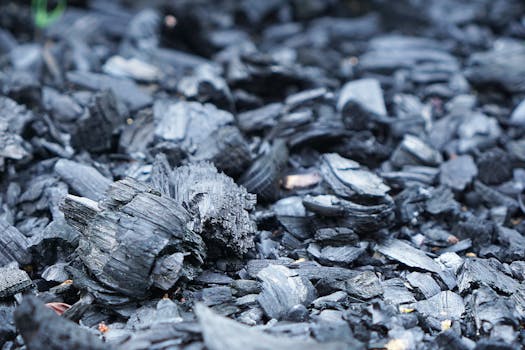The Versatile Benefits of Charcoal: A Wellness Perspective

Charcoal, a substance often associated with summer barbecues and art supplies, has a range of applications that extend far beyond its traditional uses. This humble material is gaining popularity in the wellness community for its diverse benefits. In this article, we'll explore the various uses of charcoal and how it can enhance your health and lifestyle.
1. Culinary Charcoal: Grilling to Perfection
One of the most common uses for charcoal is in cooking and grilling. Charcoal provides a high, consistent heat that is ideal for barbecuing meats, vegetables, and other foods. It also imparts a distinct smoky flavor that many people love. When choosing charcoal for grilling, opt for natural lump charcoal, which is made from hardwood and contains no additives, making it a healthier choice for your meals.
2. Charcoal in Art: Unleashing Creativity
For artists, charcoal is a go-to medium for drawing and sketching. Its rich, dark tones allow for striking contrasts and dynamic shading, making it perfect for both beginners and professionals. Charcoal's versatility can be harnessed to create everything from delicate lines to bold, expressive strokes, making it an essential tool in any artist's kit.
3. Purification Power: Charcoal for Clean Air and Water
Activated charcoal, a form of charcoal that has been processed to increase its absorptive capacity, is widely used in air and water purification systems. Its porous structure allows it to trap impurities, odors, and toxins, making it an effective filter. Incorporating activated charcoal into your home’s filtration systems can lead to cleaner air and water, promoting overall health and wellness.
4. A Natural Remedy: Charcoal in Medicine
In the medical field, activated charcoal is known for its ability to absorb toxins, making it a valuable treatment for certain types of poisoning and drug overdoses. It works by binding to harmful substances in the gastrointestinal tract, preventing their absorption into the bloodstream. However, it's important to consult a healthcare professional before using activated charcoal for medicinal purposes.
5. Beauty Benefits: Charcoal in Skincare
Charcoal has become a popular ingredient in skincare products, known for its ability to draw out impurities and toxins from the skin. Activated charcoal masks and cleansers can help unclog pores, control oil production, and improve overall skin clarity. Incorporating charcoal into your skincare routine can lead to a healthier, more radiant complexion.
6. Gardening with Charcoal: Enhancing Soil Health
In gardening, charcoal can be used as a soil amendment to improve drainage, aeration, and moisture retention. When added to soil, it helps create a more balanced environment for plants to thrive. Additionally, charcoal can help retain nutrients, reducing the need for chemical fertilizers and promoting sustainable gardening practices.
7. Industrial Uses: Charcoal's Broader Impact
Beyond personal wellness, charcoal plays a significant role in various industrial applications. Activated carbon, derived from charcoal, is used in gas masks, air purifiers, and water treatment facilities to ensure safety and health in various settings. Its ability to absorb contaminants makes it a crucial material in protecting both people and the environment.
8. Crafting with Charcoal: A DIY Delight
Charcoal is not just for cooking and purifying; it can also be a fun material for DIY projects and crafts. From creating homemade paint to using it as a natural dye, charcoal's versatility allows for creative expression in various forms. Exploring its use in crafts can be a fulfilling and enjoyable activity.
9. Traditio
nal Medicine: Charcoal's Cultural Roots
In some cultures, charcoal has been used in folk medicine for centuries to treat digestive issues and other ailments. While modern science supports some of these uses, it's essential to approach traditional remedies with caution and consult a healthcare provider before trying them.
10. Hospitals utilize charcoal, particularly activated charcoal, in several key ways:
a. Treatment of Poisoning and Overdose: Activated charcoal is commonly used in emergency departments to treat certain types of poisoning or drug overdoses. It works by adsorbing (binding) toxins in the gastrointestinal tract, preventing their absorption into the bloodstream. This is especially effective for substances that are not corrosive and for which activated charcoal can bind effectively.
b. Gastrointestinal Decontamination: In cases of acute poisoning, activated charcoal may be administered to patients who have ingested toxic substances. It is usually given within a specific timeframe after ingestion to maximize its effectiveness. The administration may involve a nasogastric tube for patients who are unable to swallow.
c. Preventing Recurrence of Poisoning: In certain cases, activated charcoal may be used to help prevent the reabsorption of toxins in patients with specific gastrointestinal conditions. This can be important in managing patients who are at high risk for repeated poisoning.
Research and Clinical Studies: Hospitals and research institutions often conduct studies on the effectiveness and safety of activated charcoal in various medical treatments, contributing to the evolving understanding of its applications in medicine.
d. Infection Control: Some hospitals use activated charcoal in wound care products to help manage odor and absorb exudate from wounds, although this is less common than its use in poisoning cases.
e. Air and Water Filtration: Hospitals also use activated charcoal in their filtration systems to maintain clean air and water. This helps create a safer environment for patients and staff by removing contaminants and odors.
While activated charcoal is a valuable tool in emergency medicine, it is not suitable for all types of poisoning and should only be administered under the guidance of medical professionals.
Charcoal is a multifaceted material that offers numerous benefits across culinary, artistic, medical, and industrial realms. From enhancing your grilling experience to purifying your air and water, this versatile substance can significantly contribute to your wellness journey.
As you explore the various applications of charcoal, consider incorporating it into your daily life to reap its many rewards. Whether you're an artist, a health enthusiast, or someone looking to enhance their gardening practices, charcoal may just be the solution you've been seeking.

